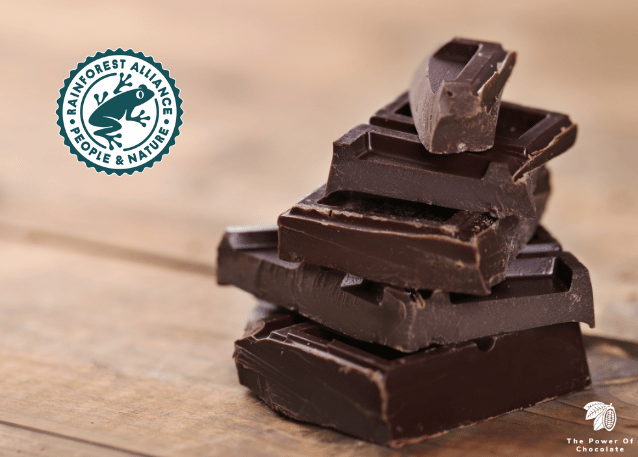
In recent years, the demand for more sustainable and ethical products has skyrocketed, and the chocolate industry is no exception. To ensure that the cacao used in chocolate production is grown responsibly, with respect for both the environment and workers, several sustainability certifications have emerged. These certifications help guarantee that the chocolate we consume has a positive impact throughout its production chain.
In this article, we’ll explore the main sustainability certifications in the chocolate industry, understand their criteria, and see how they contribute to a more ethical and environmentally conscious production.
1. Fairtrade
Fairtrade is one of the most recognized certifications globally when it comes to sustainability and fair trade. Created to ensure that producers are fairly compensated for their crops, this certification also guarantees that workers have dignified working conditions and that environmental practices are followed.
Key Criteria:
- Fair Prices: Cacao farmers receive a fair price for their crops, as well as a premium to invest in community projects and sustainable development.
- Working Conditions: Ensures that workers are in a safe environment, free from child exploitation or forced labor.
- Environmental Practices: Promotes responsible use of natural resources like water and soil, and encourages growing cacao in agroforestry systems.
Impact:
The Fairtrade seal not only improves the lives of farmers and their communities but also encourages sustainable agricultural practices that protect the environment and increase biodiversity.
2. Rainforest Alliance
The Rainforest Alliance certification promotes sustainable agricultural practices with a focus on environmental conservation and improving the livelihoods of rural workers. By purchasing products with the Rainforest Alliance seal, you are supporting the preservation of tropical rainforests and the well-being of farmers.
Key Criteria:
- Ecosystem Protection: Encourages cacao cultivation in harmony with forest conservation and wildlife protection.
- Sustainable Farming Practices: Promotes farming methods that improve soil health and reduce the use of chemical pesticides.
- Worker Rights: Ensures that workers are treated fairly, with living wages and safe working conditions.
Impact:
When you choose chocolate certified by the Rainforest Alliance, you’re supporting cacao cultivation in areas where forest and biodiversity conservation is a priority, while also ensuring the socio-economic development of farming communities.
3. UTZ Certified
UTZ Certified (now part of the Rainforest Alliance after the two organizations merged) is a certification program that promotes sustainable agriculture, focusing on efficiency, best farming practices, and improving the quality of life for farmers.
Key Criteria:
- Continuous Improvement: Farmers are encouraged to adopt farming methods that increase productivity without harming the environment.
- Transparency: The program offers traceability throughout the production chain, allowing consumers to know where their cacao comes from.
- Social Development: Promotes investment in education and social development for farmers and their communities.
Impact:
The UTZ seal indicates that cacao was produced with a focus on sustainability, efficiency, and transparency. Certified UTZ farmers have access to better markets and can sell their cacao at fairer prices.
4. Organic
Organic certification ensures that cacao is grown without the use of synthetic pesticides or fertilizers. By prioritizing practices that maintain ecological balance, this certification promotes healthier agriculture for both the environment and workers.
Key Criteria:
- No Agrochemicals: No synthetic chemicals can be used in cacao cultivation, such as pesticides or artificial fertilizers.
- Crop Rotation: Encourages crop rotation practices to maintain soil health and prevent nutrient depletion.
- Biodiversity Conservation: Promotes the preservation of natural habitats and coexists with local flora and fauna.
Impact:
Organic chocolate is a sustainable choice for both consumers and the environment. By avoiding harmful chemicals, farmers protect biodiversity and the health of local ecosystems.
5. Fair for Life
Fair for Life is a fair trade and social responsibility certification that ensures cacao producers are treated fairly and that production is carried out with sustainable practices.
Key Criteria:
- Fair Trade: Like other fair trade certifications, it guarantees a minimum price for farmers and encourages practices that benefit community development.
- Social Responsibility: Ensures that all stages of the production chain meet social responsibility standards.
- Sustainability: Promotes practices that minimize environmental impact, such as efficient water use and ecosystem protection.
Impact:
Fair for Life encourages production practices that are both fair and sustainable, while also contributing to the improved quality of life for farming communities and environmental protection.
Conclusion: The Role of Certifications in the Chocolate Industry
Sustainability certifications are essential tools for ensuring that cacao production is more fair and responsible. They play a crucial role in improving working conditions for farmers, promoting healthier farming practices, and protecting the environment. By choosing chocolates with certifications like Fairtrade, Rainforest Alliance, UTZ, Organic, or Fair for Life, you support a more sustainable and ethical production chain.
Next time you buy chocolate, keep an eye out for certification labels. Small choices can have a big impact, helping build a more sustainable and just future for the cacao industry and the communities that depend on it.
